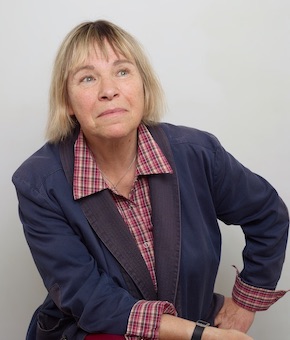Meeting Monsieur
by Catherine Axelrad
Drawing on Victor Hugo’s cryptic diary entries and letters from his wife, Catherine Axelrad’s Célina builds a snapshot of a teenage chambermaid in the Hugo household during the author’s exile in Guernsey, who was apparently prey to the great man’s gargantuan sexual appetites. With a mix of mischief, naivety, pragmatism and curiosity, Célina’s account of her relationship with the ageing writer is an arresting depiction of enduring matters of sexual consent and class relations. The following passages outline her first encounters with Hugo, on arrival at the Guernsey docks from neighbouring Alderney (Aurigny), and the following morning…
I ARRIVED AT SAINT PETER PORT on the second of May 1858, but I didn’t dare present myself at Hauteville House, as it was already ten minutes after nine when the packet-boat docked. As it was still light I thought I would at least locate the house before finding a bed at the inn, so I could get there sooner the next day and show them I wasn’t afraid of an early start. Round the harbour there were almost as many people as at Granville, but many too who seemed to have nowhere to live, and even some old vagrants who waited for the boats to beg from the passengers. The woman who pointed the way for me was so thin that her legs barely supported her; and when I told her I had nothing to give her she threatened me with a raised fist yelling at me incomprehensibly, and I was afraid she’d put a curse on me. I left at a run, but I didn’t get very far because the street which leads to the upper town is very hard to climb. Today I know this street and this house so well that when I remember how disorientated I felt on arriving, how strange everything seemed and how I lost my footing on the wet cobblestones, I feel it can hardly be the same place as where I’ve lived since.
After passing several houses I found myself in front of a door marked with the letter H. It was the most impressive building in the street, with beautifully painted iron railings and six steps leading to the doorway, but the curtains were already drawn, and I thought it best not to hang around in front of the door, in case someone came out and caught me loitering. Night was beginning to fall and I was hurrying on back, when a little lower down the street, on my left, I noticed a man coming out of a small house which I’d passed on the way up. The door stood half-open for a little while as someone said their goodbyes to him: a large respectably dressed woman who waved her hand out of the door as she blew him kisses and who spoke in a voice as low as a man’s. I heard her quite clearly as she said: ‘Until tomorrow, dearly beloved, have a pleasant night and think of me in your dreams.’ The man waved his hand in turn saying something which I couldn’t make out, and when the door closed behind him he hurriedly made his way up the street.
I don’t know what devil took hold of me. Perhaps it was just that I used to love laughing so much, and that I hadn’t had anything to laugh about for a long time.”
What I’d heard had made me want to burst out laughing, and when the man came level with me he looked at me with surprise. ‘And what are you laughing at, young lady?’ he asked with a frown. He was small and quite fat and what I could see of his face looked rather ugly. I don’t know what devil took hold of me. Perhaps it was just that I used to love laughing so much, and that I hadn’t had anything to laugh about for a long time. I held up my skirts and curtsied, bowing towards him and, in the voice of monsieur le Curé when he speaks from the pulpit on Sundays, I repeated what the large woman had said to him: ‘Until tomorrow, dearly beloved, have a pleasant night and think of me in your dreams.’ Then before he had time to utter a word, I ran off. I hurtled all the way down the road holding my skirts up before I finally dared to stop and laugh out loud, and this prank amused me so much that I laughed again at the thought of it an hour later before going to sleep.
…
Later that morning Rosalie took me on a tour of the downstairs, and I could see what she meant when she talked about a building site. It was almost impossible to move in the anteroom, and in the tapestry room the chairs weren’t even stitched together. ‘All the same, things are moving forward a lot quicker now that
Monsieur has given Mauger and his bunch of layabouts a talking to,’ said Rosalie. ‘They say that everything will be finished in a couple of days, but I’ll believe it when I see it.’ There was as much panelling as in the cathedral at Granville, all over the walls and right up to the ceiling, all carved and blackened. I couldn’t keep myself from touching it, which made Rosalie laugh; she said if I liked rubbing walls, I’d have plenty to keep me happy, for it was going to be my job to wax them. ‘But where on earth do they find it all?’ I asked. Rosalie said the wood came from old chests that Monsieur bought from farms all over the island. ‘There are at least eight in these two rooms alone,’ she added, ‘if it isn’t a crying shame to break up good furniture that’s still fit for use.’
‘So this is the importance you attach to my work!’ said a voice which made the both of us jump. It was Monsieur, who had been standing in the hall and who had overheard Rosalie’s last words. She didn’t let him fluster her though, and answered him without batting an eyelid: ‘Monsieur knows very well what I think of this work, it’s not the first time I’ve said it.’
‘And certainly not the last!’ said Monsieur stepping into the room where we were standing. He was smiling with an amused look on his face, and didn’t seem at all bothered, but as soon as I caught sight of him I thought there was nothing for it but to take the first boat back to Aurigny, for I recognised the man I’d made fun of yesterday in the street. My face went bright red, and I didn’t dare look up. At first he said nothing to me and continued talking to Rosalie.
‘Now that you have someone to help you, I hope that you’ll be as agreeable as your cooking,’ he said. ‘And what does your assistant call herself?’
He turned towards me waiting for me to reply, but I felt so ashamed that I couldn’t bring myself to speak, and it was Rosalie who said to him: ‘This is Célina Henry, Monsieur. She arrived from Aurigny this morning.’
‘This morning, indeed?’ he asked, with exaggerated surprise, from which it was clear that he had recognised me very well. I summoned all the courage I could muster and lifted my head up: ‘To tell the truth, Monsieur, I arrived yesterday evening, but it was too late to present myself.’ I looked at him wondering what he would say, but he just nodded his head saying that he hadn’t thought that any boats had come in this morning, and he gave me a one franc piece to encourage me to work well.
from Célina (Les Fugitives, £12.99)
—

Catherine Axelrad lives and works in Paris. She started writing in the late 80s while working as a teacher. Apart from Célina, her published works include three autofiction novels (including The Warszawianka, translated by Sacha Rabinovitch), a short biography of Molière, a pastiche of Proust (Albertine travestie), and a series of three YA novellas under the pseudonym Alice Chambard. In 2011 she left teaching to study Protestant theology, and in 2014 she became a minister of the Église protestante unie de France. Célina, translated by Philip Terry, is published in paperback original by Les Fugitives.
Read more
@LesFugitives
Author photo by Dominic Lee
Philip Terry is a poet, translator, a writer of fiction, and professor in poetry at the University of Essex. His poetry and experimental translations include Oulipoems, Shakespeare’s Sonnets and Dictator, a version of the Epic of Gilgamesh in Globish. The Penguin Book of Oulipo, which he edited, was published in Penguin Modern Classics in 2020, and Carcanet published his edition of Jean-Luc Champerret’s The Lascaux Notebooks, the first ever anthology of Ice Age poetry, in 2022. His version of Dante’s Purgatorio, relocated to Mersea Island in Essex, is forthcoming from Carcanet in October 2024.
essex.ac.uk

